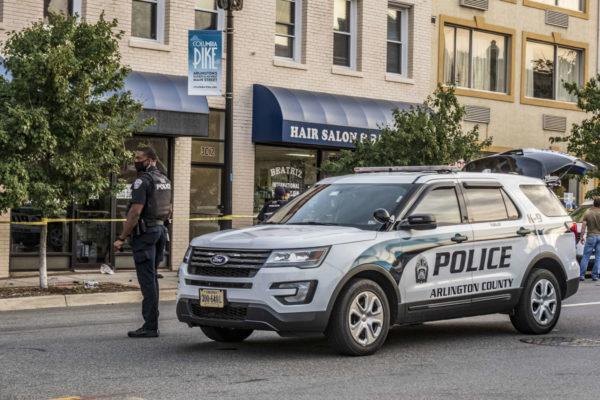(Updated 05/25 at 1 p.m.) The Arlington County Board voted 4-1 last night (Tuesday) to consider establishing a Civilian Review Board for the Arlington County Police Department.
Now the county will advertise a draft ordinance that, if approved in the summer, would outline the roles and responsibilities of this review board. Board member Takis Karantonis dissented.
“As we discuss and debate this ordinance over the next two months, we must both recognize that our community has an interest in additional accountability and transparency related to law enforcement and respect the diligent efforts of our public safety personnel,” said Matt de Ferranti, Chair of the Arlington County Board, in a statement.
What the civilian review board would look like was discussed by the Police Practices Work Group over the last year, which in February presented myriad ways to reform the police department. Some of the powers it suggested the board should have are included in the ordinance.
As written, Arlington’s civilian review board would be able to receive complaints about police conduct, review the police chief’s disciplinary decisions, as well as review finished police investigations, data, policies and the ACPD budget. It would also be able to recommend policy changes and conduct hearings and community outreach.
But it would not have the ability to independently and concurrently investigate officers, which the PPG recommends but County Manager Mark Schwartz does not.
Karantonis said last night the proposed ordinance is deficient in many ways, particularly because the authority to independently investigate a police officer is not baked in. He supported deferring the motion.
“Not a single person who testified for the advertisement of the ordinance as submitted,” he said. “In my inbox, I don’t see a single email in support.”
Fifteen PPG participants, community members and advocates told the County Board to defer action so the ordinance could be rewritten to allow for independent investigations.
“The Black and brown community is telling you that we need a civilian review board with teeth,” said community member Wilma Jones.
Minneapolis’s weak review board allowed Derek Chauvin to remain an officer despite multiple complaints of misconduct before he killed George Floyd, said Michelle Woolley, of Arlington for Justice. Meanwhile, the review board in St Louis, unable to investigate police shootings concurrently with police, had to wait more than five years to evaluate 21 shootings.
Public defender Brad Haywood said in a letter to the county that review-only models found in Virginia Beach and Fairfax are seen as “rubber stamps for police internal affairs.”
“The review bodies rarely recommend corrective action, and so far as I know they have never brought about proactive measures to address broader institutional problems, such as racial disparities in traffic enforcement or over-policing of misdemeanor conduct,” he said.
After the meeting, Julius D. Spain, Jr., the president of the Arlington branch of the NAACP, told ARLnow the board needs to revise the ordinance’s “admitted defects.”
“This current version of the CRB is not equitable and will not hold up in the long term to engender trust by our community in the public safety system,” he said. “The voices of communities of color need to be centered in this conversation.”
The public can provide direct feedback throughout June and at the July meeting. After the Board votes in July, assuming the ordinance is approved and not deferred, members of the review board would be appointed in the fall.
In a report, the county articulated many reasons not to include investigative powers.
For one, granting such powers assumes “that law enforcement is unable to fairly and impartially investigate ‘its own,'” said the report.
“This assumption is not borne out by any objective data and the analysis underway by an outside expert consultant, due to be received by the end of June, will be the best evidence on this issue,” the report asserted.
The report also listed a host of other channels for independently reviewing misconduct, including the Commonwealth’s Attorney, the Virginia Attorney General, the U.S. Department of Justice and the newly created Critical Incident Response Team of Northern Virginia police departments.
Haywood tells ARLnow this paragraph amounts to relying on the status quo, “which is consistent with the claim made in the ordinance that ‘no evidence exists’ to suggest the police are unable to investigate themselves,” he said.
He added that “there’s actually tons of evidence on that point.”
Independent misconduct investigations would also be costly, according to the document. The county estimates staffing the board could cost $425,000 annually, and an additional $500,000 to $750,000 would be needed if the board could also independently investigate cases.
“I don’t care what it costs as long as we get justice,” said Gabriel Rubalcava, one of the speakers during the public comment period.


